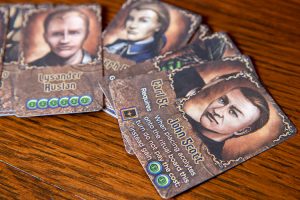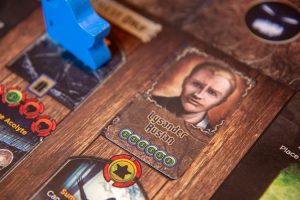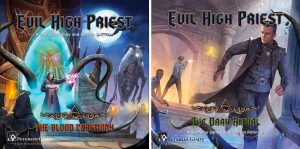I interrupted Tony’s literal mind game. “I am on this, dead Obi-Wan.”
I snatched up the two expansions to Evil High Priest that were perched on Tony’s altar/card table and bolted towards the door.
Creepy Telepathic Tony was NOT going to ruin my excitement at getting to play these two expansions!
Expansion Overview:
Blood Ceremony and Dark Ritual, but, when not being differentiated, will be collectively referred to as Expansions going forward) both exponentially expand the game play options and replay value of Evil High Priest. They add the following:
- New double-sided cult boards, changing how the game plays by adding new elements to the game
- Two new boards in Blood Ceremony and Dark Ritual, four in total (eight different Great Old Ones)
- Monster cards with special powers summoned by the cultists
- Twelve unique monsters in each expansion, twenty-four in total
- Investigator cards that add special effects to each raid
- Ten unique investigators in Blood Ceremony, eleven in Dark Ritual, twenty-one in total
- Priest cards that grant each player a special ability that can be used once per game
- Ten unique priests in each expansion, twenty in total
- Miscellaneous cards and tokens for the new cult boards
As you can see, these Expansions add significant content to Evil High Priest.

Game Experience with the Expansion:
By far the biggest addition, and the one that “wowed” me the most, was the four new double-sided cult boards. The addition of eight new Great Old Ones to the game will be appreciated by Lovecraft fans. Two of my favorites were the Crawling Chaos (Azathoth) and Yellow Sign (King in Yellow) cult boards. Crawling Chaos added the possibility of an end game where EVERYONE loses while Yellow Sign added ritual tracks to the cult board that behave exactly like the ritual board. All eight of these boards play completely different, so much so that each has its own entry in the rulebook to explain any rules questions that could come up. These alone would be worth the price of admission, especially when you consider the base game only had one board and each of the expansions has two!

After the new cult boards, the new monster cards provide the biggest gameplay impact. The Expansions add 24 unique monsters in total. Some monsters provide a special ability when summoned, others can be discarded later for a one-time benefit, while others will earn resources if they are in your lair during the Preparation phase. These cards also add a twist to summoning monsters. In the base game, the only monster you could summon was the Deep One “generic monster”. Since every monster was the same, you just simply took one and placed it in your lair. When the new monsters are added to your game, you now select one of the three available on the card display board, with a new monster immediately being drawn from the monster deck to replace the summoned monster. This adds a layer to monster summoning decision making because you may decide to wait to summon a monster if none of the available monsters interest you. This was not a concern in the base game.
The next addition to explore is the investigators. In the base game, you simply rolled one to three six-sided dice to determine the raid strength. With the Expansions, before rolling to determine raid strength, you roll one die to establish which of the three investigators on the card display board will be performing the raid.

What do the investigators do? Some add or subtract a die from the raid strength roll while others impact what will and will not count when defending against the raid or even which rooms, or the direction, the raid will take place. Many include a Post-Raid step, a new “take that” option where the player who triggered the raid can choose an opponent to have additional…misfortune, such as losing resources or even an entire chamber! I really enjoyed the additional uncertainty these cards provide to the raids, as well as some “take that” that can be used to slow down a first-place opponent. Since they are visible before the raid starts, you can begin preparing for some of the nasty ones, or perhaps trigger a raid before you are fully prepared to make sure you will be able to determine the Post-Raid target, assuming the die roll selects an investigator with that ability.
The last new gameplay element included in the Expansions is the Priest cards. These cards grant each priest cultist a unique, once per game ability that is triggered by placing your priest cultist on the card. These abilities are varied, with some being as simple as “gain two magic,” with others being more situational, such as “all your opponents lose one chamber; you gain one.” These two examples illustrate one of the issues I had with the priest cards – some are clearly better than others. In my example above, I would prefer the second card as it has the potential to benefit you more in the long run.

That being said, I clearly love these expansions. But what if I could only have one, which would I chose? I know this is a cop out, but I could not choose between the two. Both provide a significant boost in replay value and entertainment to the base game. To be frank, while I love games based on the Cthulhu mythos, I have neither read Lovecraft nor have a favorite Great Old One. The only difference in content between the two is DR has one more investigator than BC. My recommendation would be to choose the expansion that includes the Great Old Ones that you prefer because the cult boards provide the most bang for your buck.
Final Thoughts:
The Blood Ceremony and the Dark Ritual expansions are an absolute must have if you even remotely enjoyed Evil High Priest. My original 4.0/5.0 stars score for the base game is increased to 4.5/5.0 stars when the expansions are included. The new cult boards are worth it alone – add in the monsters and investigators and, in my opinion, you have two must have expansions to add to your collection!
 Hits:
Hits:
• Cult boards add an incredible amount of replay value
• Monsters add another level of decision making
• Investigators add uncertainty and some “take that” to the already feared raids
Misses:
• It feels like some of these, especially the monsters, should have been included in the base game and not required a separate purchase to add them in your game
• Priest abilities were a bit hit or miss
Disclosure: An employee for Petersen Games also writes for Board Game Quest. He had no influence over the opinions expressed in this review.
























